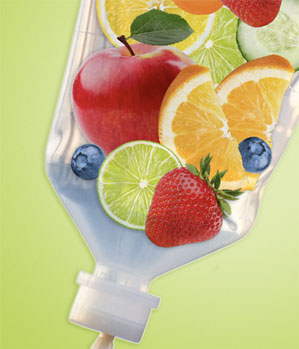A grueling physical workout or simply being more physically active than normal can deplete the body of electrolyte and fluid balance and cause state of dehydration. This makes it difficult for athletes and those wanting to increase their physical activity to perform up to their regular standards. Additionally, overuse injuries and trauma to any part of the body can take a person away from their favorite game for weeks or months at a time.
Although physical therapy is often helpful in helping athletes to recover, the process can be long and painful. Intravenous (IV) Therapy delivers vitamins, minerals, amino acids, antioxidants, botanicals, and other nutrients directly to the bloodstream. This helps to hydrate the athlete in addition to speeding recovery time from injuries. Compared to taking oral supplements, IV Hydration Therapy can provide up to 10 times the level of absorption from the same nutrients. That is because the contents of the drip bag reach the blood and cells immediately instead of having to wait to go through the wall of the stomach.
Major Benefits of IV Therapy for Athletic Performance include:
- Improved muscle strength and function due to increased protein synthesis
- Improved physical endurance
- Reduces soreness in the muscles
- Provides oxidative support to the muscles to decrease stress and damage from strains and tears
- Decreases inflammation and improves the formation of skin collagen to aid in cell repair
- Supports repair of connective tissue and muscle
- Supports fat metabolism while maintaining muscle mass
- Promotes the conversion of fat into energy
Specific Nutrients Used to Improve Athletic Performance
Providers who offer IV Therapy typically use a wide range of nutrients depending on the client’s needs. The following are popular choices for people who want to improve their athletic performance or recover faster from an injury.
Amino Acids
Having an adequate amount of amino acids present in the body helps to prevent mental fatigue, the effects of overtraining, balances the body’s fuel use during exercise, and increases the amount of anabolic hormones secreted. Amino acids help the athlete to build lean muscle as well as recover faster after a workout or injury and keep body weight at a stable level.
B Vitamins
The B vitamins include Vitamin B6, B12, folate, thiamin, and riboflavin. Known as micronutrients, the B vitamins convert carbohydrates and proteins into energy. They also assist with the production and repair of the body’s cells. When athletes don’t get enough of the B vitamins through food and beverage consumption, it can negatively affect performance and prolong recovery after an injury. Athletes who follow restricted eating plans or those who limit their calories are at highest risk for B vitamin deficiency.
Glutathione
The body naturally produces glutathione when a person consumes the amino acids cysteine, glycine, and glutamine. However, high-intensity workout or strength training has an oxidative effect on the body. This means it produces more free radicals in the bloodstream, which is another name for oxidative stress. Increasing the level of glutathione through IV Therapy introduces sulphur into the system. Sulphur sticks to free radicals and causes them to leave the body through normal elimination. Another benefit of glutathione is that it improves metabolism, making it easier for the athlete to burn calories and maintain a healthy body weight.
Magnesium
Magnesium plays an essential role in approximately 325 enzyme reactions. This includes several functions of importance to athletes, such as fat and protein synthesis, muscular contraction, bone metabolism, normal cardiac activity, and neurological functioning. However, many people don’t eat enough whole grain cereal, green leafy vegetables, nuts, and seeds to get the level of magnesium their body needs for optimal functioning. This vitamin is especially critical for athletes wanting to maintain a healthy body weight and avoid muscle injury.
Vitamin C
Intense exercise increases the body’s level of oxidative stress by as much as 10 to 15-fold. As one of the antioxidant vitamins, Vitamin C is instrumental in protecting the membranes of the cells from oxidative damage. It also helps to improve strength and energy. Athletes who don’t receive adequate nutrition from fruits, vegetables, and whole grains should especially consider receiving high levels of Vitamin C through an IV Therapy infusion.
Zinc
Zinc is a required nutrient for the building and repair of muscle tissues, normal growth, the production of energy, and a strong immune system. Low levels of zinc can also affect thyroid imbalance, a problem that can affect the performance level of athletes at all levels. People who follow a vegetarian diet or who regularly consume foods high in fiber or low in animal fat are at a higher risk for zinc deficiency.
Athletes who are struggling with maintaining a consistently high performance or who want to heal faster from injuries can benefit greatly from adding IV Therapy to their routine.


